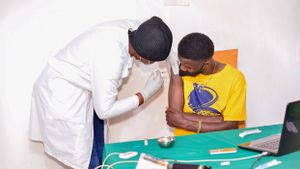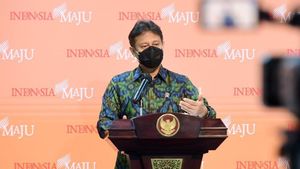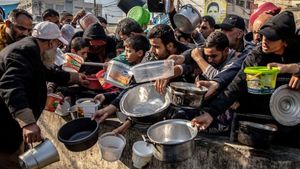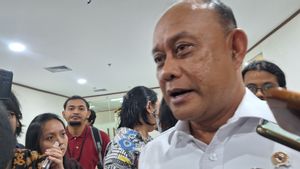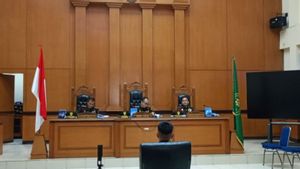JAKARTA - The World Health Organization (WHO) has officially declared the Omicron variant (B.1.1.529) as the cause of the increase in cases in Africa as well as a variant of concern (VOC) on Friday, November 26, 2021.
The Omicron variant first appeared in Botswana, neighboring South Africa, reported in vaccinated people.
In response, member of Commission IX DPR RI Rahmad Handoyo suggested three wise steps to address the emergence of a new variant of the coronavirus type B1.1529. Where the virus was immediately designated by WHO as a variant of concern (VoC).
"The first and most important step in responding to the emergence of a new variant that has caused concern for the world community, yes, we must not panic and worry. This is important and the main thing," Rahmad told reporters in Jakarta, Sunday, November 18.
The board member who sits on the health commission explained that basically, the characteristics of the virus are mutating. By mutating, the virus can become weaker or vice versa, more worrying.
“That is, looking at the biological characteristics of the virus, mutation is a necessity. That's why we don't have much choice, we have to face it calmly, don't panic," he said.
SEE ALSO:
The second step, Indonesia must follow the recommendations of WHO and experts in this field. According to Rahmad, Indonesia must coordinate and synergize with the international community to increase understanding, anticipation and control of the Omicron variant.
"The recommendations and policies set by WHO in dealing with the Omicron virus must be our attention. Then we add our own policies, both to add and adjust," said the PDI-P politician.
In accordance with the recommendations of WHO and experts, added Rahmad, this new variant is faced in a scientific and risk-based way. This means that 3T, namely testing, tracing, treatment must be strengthened.
"Furthermore, based on risk, we continue to seek behavior change by means of passive 3 M then added by reducing mobility, activities, visiting crowded places," he explained.
The legislator from Boyolali, Central Java added, for now, one of the effective ways to fight the pandemic is vaccination. According to WHO and scientific experts, the vaccine is quite effective against whatever the COVID-19 variant is.
"Even though the omicron variant was detected for the first time in South Africa and has spread to a number of countries, it is predicted to be able to resist vaccination. However, vaccination must continue to be intensified according to the government's target. Along the way, scientists will certainly continue to study, improve and perfect the vaccine. At least we optimize our vaccination against COVID-19," he said
The third suggestion, while waiting for further developments, Rahmad assessed, the entrances to Indonesia, both at airports or seaports, land borders, must be tightened. And quarantine obligations must be tightened because quarantine is the country's defense as well as from the threat of mutation viruses from outside.
"Including the quarantine process, we must strengthen so that officers continue to maintain according to the health protocols that have been determined. Foreign nationals visiting Indonesia and Indonesian citizens returning from other countries must continue to follow health protocols," he said.
To note, currently the Omicron variant has been confirmed to spread in several countries. Here's the list:
1. Australia
Australia just reported its first case of the Omicron variant on Sunday, 28 November. The positive confirmed cases came from 2 tourists who are currently quarantined in New South Wales, one of the states of Australia.
Both tourists have travel history from South Africa and landed in Australia on a Qatar Airways flight.
2. Hong Kong
Hong Kong found its first case of the Omicron variant infecting a patient who had recently returned from South Africa.
However, after a few days, a guest from a hotel in Hong Kong also tested positive for the Omicron variant of COVID-19. The finding of two cases of this new variant has sparked anxiety among travelers arriving in Hong Kong.
3. English
The UK has confirmed its first 2 cases of Omicron variant COVID-19. Both cases relate to travel from South Africa.
4. South Africa
South African Health Minister Joe Phaahla said the Omicron variant was now a serious concern. Virologists detected nearly 100 cases linked to the Omicron variant in South Africa.
5. Israel
The first case of the Omicron variant in Israel came from a patient who had recently traveled from Malawi.
Currently, the Israeli government has implemented a partial closure of the border area (lockdown) to prevent the spread of this new variant.
6. Belgium
In Belgium, the patient infected with the Omicron variant had just returned from Egypt. The case is also the first confirmed case of the new variant in Europe.
7. Italy
Italy reports that it has detected the first case of the Omicron variant detected in a traveler from Mozambique.
8. Germany
Germany has just announced the findings of 2 cases of the Omicron variant detected in the state of Bavaria and another case in West Germany. It is known that the 2 cases entered through Munich Airport on November 24.
9. Czech Republic
The Czech Republic reported the first case of the Omicron variant in a woman who had recently traveled internationally to Namibia. The woman is known to have been vaccinated and is showing mild symptoms.
The English, Chinese, Japanese, Arabic, and French versions are automatically generated by the AI. So there may still be inaccuracies in translating, please always see Indonesian as our main language. (system supported by DigitalSiber.id)



